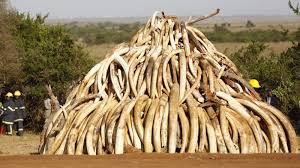Balala is in Brussels, on behalf of the 32-member state African Elephant Coalition (AEC), to meet senior EU Commission and member state officials in advance of the Environment Council meeting on 5th March, to call for closure of Europe’s domestic ivory markets.
Member states are formulating the EU position on ivory trade in advance of the 18th Conference of the Parties of CITES, the Convention on the Trade in Endangered Species (CoP18), to take place in Sri Lanka, 23rd May – 3rd June, 2019.
One of Balala’s meetings was with Jyrki Katainen, Vice-President of the European Commission, to make the case for the EU to end its ivory trade and close its domestic market now.
He also met the Japanese Ambassador to the EU to communicate the concerns of the Coalition and to discuss how legal ivory markets in the EU and Japan fuel illegal trade, poaching and killing of elephants in Africa.
Elephants are declining significantly throughout Africa and Asia. Every year, at least 20,000 African elephants are killed illegally for their ivory and only bold action now can save this iconic animal from becoming extinct in many parts of its range within the decade.
“All legal ivory markets – whether in Asia or Europe – fuel illegal trade, poaching and killing of elephants, which is why we are calling on the EU and EU Environment Ministers who are meeting in Brussels tomorrow, on 5th March, to close its domestic ivory markets and follow the lead of China, US, Taiwan, Singapore and Hong Kong SAR, who have taken or are taking steps to close their domestic ivory markets,” said Balala in a statement issued in Nairobi.
“During the last decade approximately 144,000 elephants were killed across Africa due to poaching,” explained Cabinet Secretary Najib Balala, confident that this visit will finally persuade the EU to close its domestic ivory markets,” he added.
He pointed out that there is no link between domestic ivory markets in Europe and Asia and illegal trade, and noted that the killing of elephants in Africa is a flawed basis on which to develop EU conservation policy.


